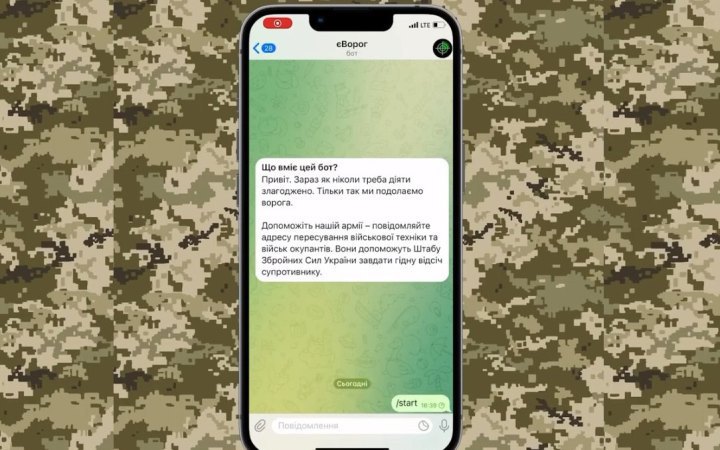On 29 April, the Telegram messenger blocked the eVorog [eEnemy] chatbot, which was used to report on the movement of the occupiers, and a number of other bots of the Defence Forces. As of 10 a.m., the service was restored.
The blocking was reported by the Defence Intelligence of Ukraine.
"Today, the management of the Telegram platform has unreasonably blocked a number of official bots that countered Russia's military aggression against Ukraine, including the Main Intelligence Bot. This happened contrary to the rules and public statements made by Telegram's management," the statement said.
The Defence Intelligence of Ukraine assured that despite the blocking, the personal data of Ukrainians is safe.
At the same time, it is noted that the Russians are creating chatbots with similar names. The DIU urged people not to send any personal data to it.
"We are already restoring the bot's operation on other platforms. The following channels are still available for communication: official mail: [email protected]; Signal: +38 096 945 53 41; WhatsApp: +38 096 945 53 41," the intelligence service added.
The Russian Freedom Legion, which is fighting on the side of Ukraine against the Russian occupiers, also announced the blocking of its bot.
Earlier, Telegram founder Pavel Durov announced that the messenger would block accounts and bots "that collect coordinates for targeted strikes or publish direct personal information with calls for violence."
At around 10 o'clock, the Strategic Communication Centre reported the resumption of eVorog, the GUR and SBU bots.
What is eVorog?
The Ministry of Digital Transformation launched the eVorog chatbot on Telegram in March 2022. At that time, Ukrainians were urged to film and send footage of Russian equipment. As of June, Ukrainians have sent more than 940 applications for collaborators.
In addition, the chatbot called on Ukrainians in the occupied territories to report enemy radar and communications equipment.
What's wrong with Telegram
- The head of the Defence Intelligence of Ukraine, Kyrylo Budanov, said that the Telegram messenger is a problem from the point of view of national security, but it can be used to Ukraine's advantage. Earlier, Ukrainian intelligence also noted that the messenger poses a number of threats to Ukraine's security, so it is necessary to look for solutions to this problem.
- Last July, the New York Times reported that the FSB monitors communication on Telegram and WhatsApp, particularly in the occupied territories of Ukraine. And the British newspaper Financial Times wrote that secret data of American government agencies, including law enforcement and intelligence agencies, is being traded on Telegram. Attackers often have ties to Russia. According to research, Russia has the greatest information influence on Ukrainians through Telegram.
- Back in 2022, the SBU published a list of Telegram channels coordinated by the Russian General Staff.
- On 25 March, the Verkhovna Rada registered draft law No. 11115, which would allow the regulation of information sharing platforms. This also applies to the Telegram platform.
- Ilya Vityuk, head of the SBU's Cyber Security Department, stressed that there is no secure messenger today. There are "technical solutions" that allow access not only to Telegram but also to Signal, Viber, and others. It confirmed that Telegram is actively used in Russian disinformation campaigns. There are a number of platforms already established and new ones are constantly being added under the guise of Ukrainian ones, which allegedly "know the internal situation in the pro-government offices".
The SBU regularly contacts all platforms to block or remove dangerous content. However, none of them - neither Telegram, nor Facebook, nor Meta, nor Google - are officially represented in Ukraine, nor do they have a legal entity. Therefore, they are not obliged to comply with our requests and demands. The SBU has submitted an initiative to have all international platforms open their official representative offices in Ukraine. Then they will be obliged to comply with the decisions of the Ukrainian court.








